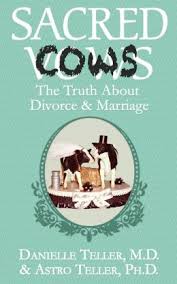By Astro Teller and Danielle Teller
When asked why all of her marriages had failed, anthropologist Margaret Mead is said to have replied “I beg your pardon; I have had three marriages and none of them was a failure.” This statement (apocryphal or not) highlights our social tendency to equate divorce with failure. Culturally, we believe that divorce reflects weakness and selfishness, and the “failure” label applies not only to marriages, but also to the people who divorce. Our society does not like quitters, and divorce is seen as a form of quitting.

“But I’m not the sort of person who gets divorced!” is a common refrain for people teetering on the brink of divorce. Perhaps you have even had that thought yourself. We all like to think of ourselves as loyal, responsible, morally upstanding, caring people, and we subconsciously believe that people who divorce do not possess these qualities.
When you stop to think about it, the idea that there is a monolithic “divorcing type” doesn’t make a lot of sense. First, a large proportion of individuals are never even given the choice to stay married. As the old adage goes, it takes two people to stay married but only one to get divorced. Second, there are probably as many reasons for divorce as there are divorced individuals. High rolling investment bankers have been known to divorce to reduce tax payments. King Henry VIII got divorced because his wife didn’t bear him a son. Basketball player Dennis Rodman split from Carmen Electra purportedly because he was of “unsound mind” at the wedding. When you discover that someone is divorced, all you can really conclude is that he/she or his/her spouse believed that divorce was the better alternative to staying married.
If people who get divorced are as diverse and complicated as people who don’t get divorced, shouldn’t the stigma of divorce go away?
Maybe it should, but it is not. While divorce is unquestionably more socially acceptable today than it was sixty years ago, the stigma of divorce may currently be increasing, at least among educated and upper-middle class Americans. Laurie Essig, a professor of sociology at Middlebury College, says that among the relatively affluent, “divorce has become a source of shame, a mark of failure, a sign that you just aren’t working hard enough.” A 2011 article in the New York Times described the rarity of divorce among college-educated Americans and the ways in which divorced female suburbanites feel judged by their latte-sipping, Whole Foods-shopping, Bugaboo-stroller-pushing peers. Women interviewed for the article described being shunned by acquaintances and feeling the need to apologize for being divorced.
As a society, we feel threatened by divorce. We stigmatize divorce because we hope that the spectre of guilt and shame will keep married couples together. We worry that allowing people to divorce without condemnation and self-hatred will lead to annihilation of the nuclear family. This, in turn, will cause our entire culture to come crumbling down, since the nuclear family is the cornerstone of our society.
This theory is not testable, and so we can’t say that it is wrong. Maybe the message “You are a bad person if you divorce” is all that keeps us from devolving into savagery, and maybe everybody would be happier if they just got married and stayed married. Rightly or wrongly, however, our society also espouses the belief that individuals should be able pursue their own happiness and determine the course of their own lives. In fact, our society has already decided that personal happiness trumps social good when it comes to marriage and divorce. One piece of evidence for this is that no-fault divorce is now legal in all 50 states in America.
Divorce is one of the most stressful and painful life events that anyone can experience. Perhaps it is time that we stop judging and stigmatizing people who suffer through such a terrible time and give them a helping hand instead.
Astro Teller is a computer scientist and entrepreneur who currently oversees Google[x], Google’s moonshot factory. Danielle Teller is a physician specializing in the fields of intensive care and lung medicine; she has trained doctors and has run research programs at the University of Pittsburgh and Harvard University. Together, they bring a fresh and startling perspective on marriage and divorce in their book Sacred Cows: The Truth About Divorce & Marriage.
Drs. Teller know better than most that finding the right partner in life doesn’t always happen the first time around. Through their own divorces they learned how widely held cultural assumptions and misinformation that nobody thinks to question—what they refer to as “sacred cows”—create unnecessary heartache for people who are already suffering through a terrible time. Combining the rigor that has established them as leaders in their respective fields along with a dose of good-natured humor, the Tellers ask readers to take a fresh look at seven common sacred cows: the Holy Cow, the Expert Cow, the Selfish Cow, the Defective Cow, the Innocent Victim Cow, the One True Cow, and the Other Cow. This is not a book that is “for” marriage or “for” divorce, but “for” the freedom to decide how to live most honestly and happily either as part of a couple or a single person.